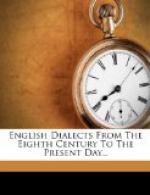PREFACE
I. Dialects and their value.
The meaning of dialect. Phonetic decay
and
dialectic regeneration.
The words twenty, madam, alms.
Keats;
use of awfully.
Tennyson and Ben Jonson; use of flittermouse.
Shakespeare; use
of bolter and child. Sir W. Scott;
use of
eme.
The English yon. Hrinde in Beowulf.
II. DIALECTS IN EARLY TIMES. The four old
dialects. Meaning of
“Anglo-Saxon.”
Documents in the Wessex dialect.
III. THE DIALECTS OF NORTHUMBRIA; TILL A.D. 1300.
The Anglian period.
Beda’s History
and “Death-song.” The poet C{ae}dmon.
C{ae}dmon’s
hymn. The
Leyden Riddle. The Ruth well Cross. Liber
Vit{ae}. The
Durham Ritual.
The Lindisfarne and Rushworth MSS. Meaning of
a
“gloss.”
Specimen.
IV. THE DIALECTS OF NORTHUMBRIA; A.D. 1300-1400.
The Metrical Psalter;
with an extract.
Cursor Mundi. Homilies in Verse. Prick of
Conscience.
Minot’s Poems. Barbour’s Bruce; with
an extract. Great
extent of the
Old Northern dialect; from Aberdeen to the Humber.
Lowland Scotch
identical with the Yorkshire dialect of Hampole.
Lowland Scotch
called “Inglis” by Barbour, Henry the Minstrel,
Dunbar, and Lyndesay;
first called “Scottis” by G. Douglas.
Dr Murray’s
account of the Dialect of the Southern Counties of
Scotland.
V. NORTHUMBRIAN IN THE FIFTEENTH CENTURY. Northumbrian
of Scotland and
of England in
different circumstances. Literature of the fifteenth
century; poems,
romances, plays, and ballads. List of Romances.
Caxton. Rise
of the Midland dialect. “Scottish”
and “English.”
Jamieson’s
Dictionary. “Middle Scots.” Quotation
from Dunbar.
VI. THE SOUTHERN DIALECT. Alfred the Great.
The Anglo-Saxon Chronicle.
Old English Homilies.
The Brut. St Juliana. The Ancren Riwle.
The
Proverbs of Alfred.
The Owl and the Nightingale. A Moral Ode.
Robert of Gloucester.
Early history of Britain. The South-English
Legendary.
The Harleian MS. 2253. The Vernon MS. John Trevisa.
The Testament
of Love.
VII. THE SOUTHERN DIALECT OF KENT. Quotation
from Beda. Extract from an
Old Kentish Charter.
Kentish Glosses. Kentish Sermons. William
of
Shoreham; with
an extract. The Ayenbite of Inwyt. The Apostles’
Creed in Old Kentish.
The use of e for A.S. y in Kentish.
Use
of Kentish by
Gower and Chaucer. Kentish forms in modern English.




